By Fr. Pietro Magliozzi
THE EXTRAORDINARY ASSEMBLY OF THE INTERNATIONAL LAY CAMILLIAN FAMILY, a step forward of hope for the Camillian laity
Rome, 14-19 October 2018
The house of the Handmaidens of the Incarnation of Villa Primavera in Rome hosted this international meeting of the LCF which, surprisingly, witnessed the presence of 25 nations (some for the first time, for example Pakistan and New Zealand), with 62 representatives (27 spiritual assistants and 35 presidents and lay people). Figures were present who gave an enhanced profile to the meeting, such as the former Superior Generals Angelo Brusco and Frank Monks, two former international presidents of the LCF, Isabel Calderon and Rosabianca Carpene, and three Camillian Provincial Superiors: Fr. Eduardo Morante (Peru), Fr. Rosario Messina (Sicily and Naples) and Fr. Alfred György (Austria, Hungary). Also present were Fr. Jesus Ruiz, the former international head of the LCF, and two current animators of the international LCF: Fr. Laurent Zoungrana and Marie Christine Brocherieux, with all of the general committee of the LCF (Maria Bako, Giosuè Sparaccino and Anita Ennis).
The participants, after arriving in the evening of 13 October, began to get to know each other and on 14 October they went to St. Peter’s Square to take part in the canonisation of seven saints, amongst whom stood out Pope Paul VI and Msgr. Oscar Arnulfo Romero. A lunch and a visit to the mother Church of St. Mary Magdalene gave a Camillian touch with which to begin all the deliberations of the meeting in the right spirit.
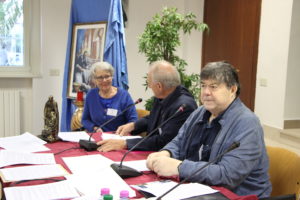 On Monday 15 October the Superior General Leo Pessini, even though he had been admitted to hospital for 43 days and was sorely tested by the ‘frailty of human nature’, managed to take part in the beginning of the deliberations as envisaged by the programme. He welcomed those taking part and concentrated on three concepts: 1-Pentecost: creating communion in diversity; 2-discernment: knowing how to create silence in order to internalise the contents of the deliberations and make the most suitable choices to take the right decisions; 3-the future: always seeing it with hope in every choice that is made.
On Monday 15 October the Superior General Leo Pessini, even though he had been admitted to hospital for 43 days and was sorely tested by the ‘frailty of human nature’, managed to take part in the beginning of the deliberations as envisaged by the programme. He welcomed those taking part and concentrated on three concepts: 1-Pentecost: creating communion in diversity; 2-discernment: knowing how to create silence in order to internalise the contents of the deliberations and make the most suitable choices to take the right decisions; 3-the future: always seeing it with hope in every choice that is made.
Arnaldo Pangrazzi, with his usual verve, chaired the meeting and introduced all of those taking part. In his introduction, he presented the identity of the lay people of the LCF as the bearers of our charism to the fringes of the world and the face of presence and hope at the side of those who suffer and a model of the Good Samaritan.
The first paper to be given was that of Fr. Leo Pessini, who has been the Superior General of the Camillian Religious since the year 2014. Its title was ‘Called to Holiness in my Reality: Pope Francis and the Exhortation Gaudete et exsultate’. After introducing the concept of holiness as ‘knowing how to do ordinary things in an extraordinary way embodying an aspect of the Gospel’, Fr. Leo went on to comment on the eight beatitudes because saints know how to bear witness to these approaches by embodying them in their lives. As regards these beatitudes, his comments on the beatitude linked to tears and on the beatitude linked to persecution were original. ‘Certain mysterious realities’, said Fr. Leo, ‘are only seen when your eyes are washed by tears’; knowing how to defend the Church against persecution by calumny and falsehood with St. Michael the Archangel is a beatitude that is as relevant as ever. The subsequent dialogue about this paper ended with the concept that blessedness or holiness is living happiness and creativity notwithstanding everything or, as St. Teresa of Calcutta said, ‘seeing deeply the positive that other people do not see’.
READ HERE THE MESSAGE OF THE SUPERIOR GENERAL
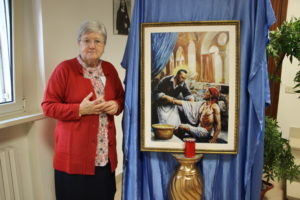


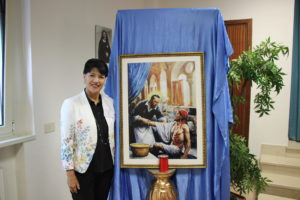


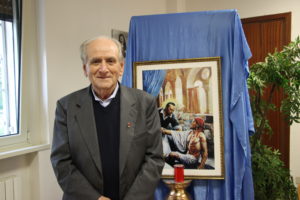


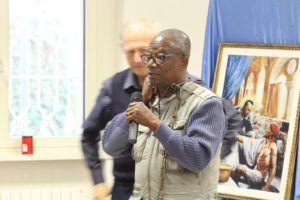


In the afternoon of the second day the lay representative Gregoire Ahongbonon, the father of a family and a car mechanic from the Ivory Coast, and today a lay person aggregated to the Order of Camillian who has founded in Togo, Benin, the Ivory Coast and Burkina Faso tens of centres based on Camillian spirituality for mentally ill people, gave a talk. He is a simple man who only asks for prayers for himself, aware that everything he has done is a gift of God and inspired by God. Gregoire defines himself as a ‘Jesus amongst the sick’. His paper was entitled ‘St. Camillus de Lellis, Mental Health and Reintegration from Social Exclusion’. Everything began, as always, after an existential crisis when Gregoire received in 1982 the grace to go to Jerusalem where he felt his vocation to serve the poor in prisons, then street orphans, then lepers and in 2010 the mentally ill, who have been his specific concern ever since. Gregoire hosts about 250 people and helps them by buying medical products and then restoring to them a name, dignity, love, a job, freedom (because in their countries they chain them up to a tree or put them in cages) and, above all else, having them recover their faith in a God who has continued to love them (when they own parents had abandoned them). For this reason, Gregoire has received a great deal of help and recognition from the Camillians and from international organisations and he is constantly asked to speak to psychiatrists and volunteer associations in Europe and Africa. Fr. Monks and Fr. Messina told touching stories in which one could see the faith and the courage of this man who on his own has performed miracles of charity. The most surprising thing that Gregoire teaches the world of psychiatry is that 70% of the patients that he receives in his centres go back to their families; today, 60,000 people who have been in his centres are leading normal lives and have jobs – naturally, they go on taking their drugs and medicines. What is Gregoire’s secret and what is his treatment? Medical products, love and trust in patients, without being afraid of these people and chaining them up. Gregoire restores hope to these kinds of patients whom nobody knows how to treat, humanly speaking; patients who represent the epidemic of the twenty-first century, the most numerous and the most difficult to treat. As regards relapses, Gregoire proposes a meeting every Saturday with them for the purposes of health-care education, a moment of spiritual retreat, and he concentrates from the outset on strong work with their families who constitute a primary cause of their condition.



The testimonies that followed were those of Angela from Austria; Rebert, an accountant from Haiti; Magda of Peru; Guillermina of Tanzania; Veronica, a nurse from Chile; Michel, a social worker from Australia; and Laurent, a doctor from Burkina Faso.
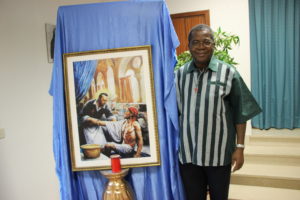


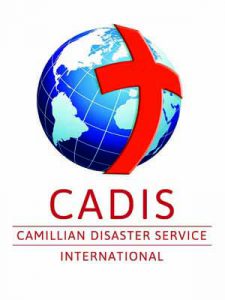


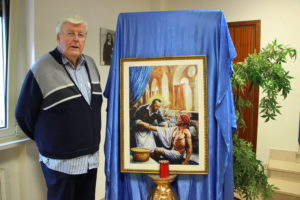


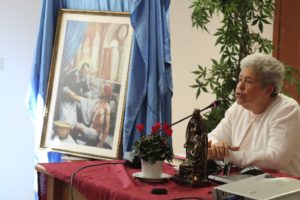


The next paper was given by Isabel Calderon, the first international president of the LCF. It was entitled ‘Living the Camillian Charism with Faithfulness and Creativity’. After beginning from her vocational experience and how she had met the Camillians through a crisis (an element common to all those participants who gave their testimonies), she demonstrated what for her are the eleven principal challenges for the Camillian charism in the world of health and health care today. The first is choosing where to invest most forces, in hospitals or homes; the second is training in pastoral care in health; the third is the promotion of vocations to Camillian voluntary work; the fourth is palliative care; the fifth is how to multiply centres for listening to people and relationships of help in a world of increasingly painful loneliness; the six is how to accompany death and mourning; the seventh is the humanisation of health centres; the eighth is how to help family relatives and health-care workers with ecumenical units of spiritual accompanying in hospitals; the ninth is choosing preferential options for those who are most excluded in a throwaway society; the tenth is the pedagogics of health (promotion and prevention); and the last is collective emergencies. Isabel said that this list does not cover all the needs that exist but it demonstrates how much our charism is rich and full of areas of work that should be developed. One contribution from the floor related the miraculous story of Camillian accompanying carried out with love for a patient with Alzheimer’s disease in Palermo: a twelfth challenge of today’s world.
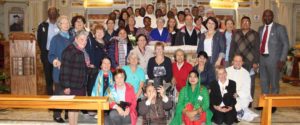


On Friday 19 October the group went on a pilgrimage to Bucchianico and Manoppello and took part in a Holy Mass celebrated by Fr. Zoungrana. They had a very good lunch at the Nicola D’Onofrio Institute of Bucchianico and spent a wonderful day full of Camillian spirituality. On Saturday 20 October the participants said goodbye to each other in the morning before returning to their respective centres of apostolate.
The meeting was an integration of spiritual moments (morning prayers, Holy Mass in the afternoon where the various languages used alternated with one another and were joined), moments of formation and updating, and relational moments of sharing that gave a great deal of room to spontaneity and moments for meals and rest. They made these six days a meaningful and very enriching experience that will provide hope amidst the strength and freedom of the laity today. These six days were an intense experience that meant that the 62 participants would return with new energy to their settings and challenges of daily life to construct a world of the freedom and truth of love, a world where the mysticism of Camillian charity is present, a more human world of health and health care.





